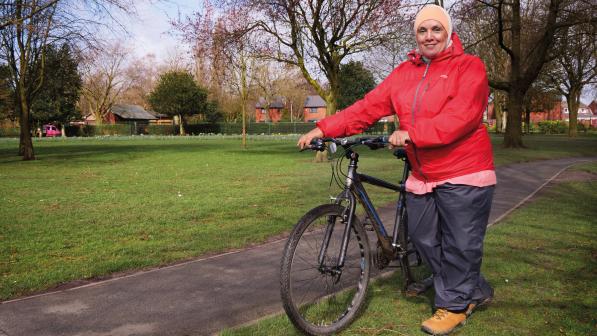How cycling can improve mental health

To mark Stress Awareness Month, we look at how cycling can benefit our wellbeing and help relieve stress. The physical health benefits of cycling are well known, but the activity comes with a host of benefits for emotional health, too.
The UK – and around the world – we’re experiencing what has been described as a stress epidemic. Research has shown that 79% of UK adults feel stressed at least once a month. A little bit of stress is a good thing – it can be motivating.
But too much has the opposite effect, with people unable to cope. Almost three-quarters of UK adults have reported that they are so stressed they feel overwhelmed. Just over half of stressed adults also said that they felt depressed or anxious.
Cycling can be an excellent antidote, improving mood and bringing a whole host of further benefits.
Why cycling
All exercise is good for improving emotional health. But cycling comes with its own particular advantages.
A survey on cycling and mental health by cycleplan found that 75% of respondents reported a boost to their mental health after cycling. This was reinforced by Cycling UK’s Rides of Way report which found 91% of people found riding off road fairly or very important for their mental health.
There are several reasons for this.
It has been shown that riding a bike relieves stress. A study published on BMJ Open found a link between cycling and lower levels of stress. Researchers concluded that “adult bicycle commuters had lower risk of being stressed than commuters of other transport modes. Also, bicycle commuters who bicycled four or more days per week had a lower risk of being stressed than those who bicycled less than that”.
Interestingly, one of the reasons for this appeared to be access to green space. There is a lot of research into how nature benefits wellbeing, and this is something that Mind agrees with.
Cycling gets you out in the open, and a study published in Environmental Science and Technology in 2011 found that “compared with exercising indoors, exercising in natural environments was associated with greater feelings of revitalisation, increased energy and positive engagement, together with decreases in tension, confusion, anger and depression”.
Both being outside and exercising are incredible mood boosters, helping to combat both depression and anxiety, as well as stress. You might have experienced what some people refer to as a ‘cycling high’ – after cycling levels of feel-good hormones serotonin and dopamine are elevated.
Natural light improves vitamin D uptake and can help with seasonal affective disorder. A VitalityHealth survey found that levels of depression among cyclists were approximately 25% lower than an inactive group.
This is something I can relate to. I suffer from both depression and anxiety, and I know that being out on my bike will always improve my mood. No matter how hard it might be to get out there sometimes, I always feel the benefit and I’ve never regretted a ride.

The importance of sleep to mental wellbeing can’t be overstated, and it turns out that cycling can help with this too. It reduces cortisol levels, a stress hormone that has been shown to disrupt sleep, while that boost the serotonin helps promote more restful sleep.
Cycling can improve your self-esteem by giving you a sense of achievement. When suffering from depression or anxiety, finding motivation to do anything is a challenge. But with even a short cycle ride you can see that you’ve physically transported yourself from one place to another.
Setting achievable goals helps with this. If you commit to cycling to the local shops once a week, the feeling of achievement that you get from hitting that goal will act as a powerful motivator to keep going, while boosting your self-esteem.
There’s also the social aspect. Cycling offers contact with others on many different levels. You might choose to ride alone, but still find a shared smile and nod with fellow cyclists provides a feeling of connection. Taking part in social rides or joining a local club will give you a whole network of like-minded people to bounce off.
In addition to all this, cycling is easy to fit into your routine. Swapping just three or four shorter journeys per week – cycling to work or to the shops, for example – will make all the difference. You don’t have to drag yourself to a gym. Talking of gyms, cycling also works out a lot more affordable. Once you’ve got your bike – which you can pick up second hand – you really don’t need any other equipment.
Living through lockdown
It’s almost impossible these days to talk about mental health and not mention the effects of the coronavirus pandemic and resulting lockdowns. This was an intensely stressful and lonely time for hundreds of thousands of people.
Cycling provided a lifeline for many of us. It got us out of the house at a time when being outside was strictly limited. It gave us a way of exercising that was socially distanced. We often talk of the sense of freedom that cycling can give, and this was never clearer than during the various UK lockdowns.
A lot of people took up cycling for the first time during this period as a way of both keeping fit and looking after their mental health, reporting that cycling was a means of escaping everything that was going on. At a time when group rides were prohibited, online apps like Strava and Komoot provided an all-important sense of connection.
Cycling for mental health
One of the main problems with addressing mental health is the stigma that still surrounds it. This is why the World Health Organisation set up World Mental Health Day – to put mental health on a par with physical health and to provide a space to talk about it and to ask for help where needed.
Cycling UK wants to be part of this conversation. Cycle 4 Health is a programme that provides a route into regular activity, building fitness and self-esteem, delivered on behalf of the West Yorkshire Combined Authority City Connect project.
Assistant practitioner in occupational therapy Jacqueline Sharp helped deliver cycle training at Fieldhead Mental Health Hospital in Wakefield. She highly recommends cycling for those suffering from a mental health condition. Feedback from patients, she says, particularly highlighted the social aspect.
Cycling is a wonderful way of managing mental health; it isn’t a cure all, though, and if you’re struggling, you may need to talk to a professional. Take a look at our list of services that offer support.










